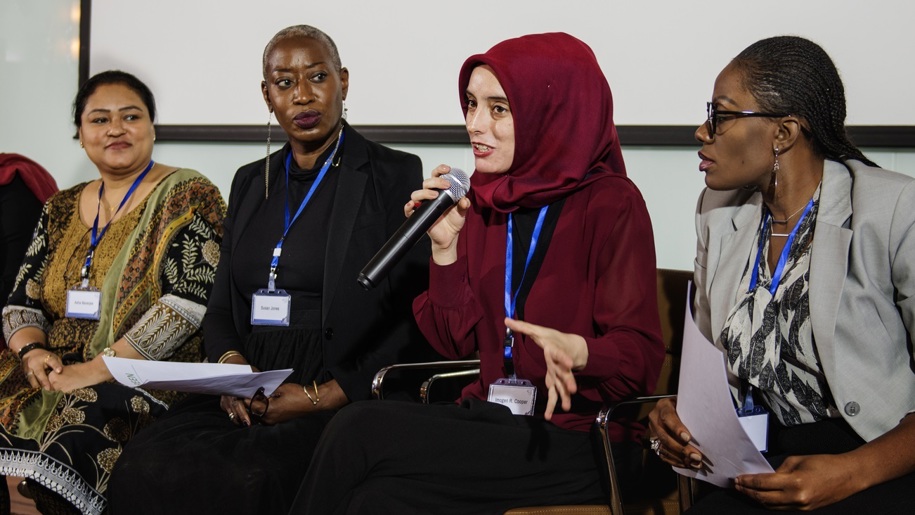
The RCOG is working to influence long-term, sustainable change to women’s healthcare service delivery globally. Advocacy sits at the heart of that.
Our advocacy is grounded in the right to health. And we’re guided by the experiences of our international members, fellows and trainees as they deliver care to women, girls and those who are pregnant in low-resource settings.
We provide support, training and resources for international members and healthcare professionals with two overriding aims:
- to help them call for changes in attitudes among healthcare providers
- to influence policy and practice reform at a local and national level.
But we can’t make the change we want to see alone. It is why we collaborate with national and international partners on joint advocacy for policy and practice reform, both within the UK development agenda and at a global level. We use our voice to amplify the lessons and experiences of our members and partners, providing a platform for them to be heard in international advocacy spaces.
Advocacy priorities
Abortion and contraception
Around the world, 257 million women and girls who want to avoid pregnancy are not currently using safe, modern methods of contraception. Our advocacy aims to support healthcare professionals to improve access to contraceptives and quality, safe abortion care. That means making contraception and abortion in health services mainstream, promoting medical abortion as a safe and effective method to deliver abortion care, and calling for greater investment to increase healthcare professionals’ capacity to deliver, improve and champion abortion care and contraceptive services.
Gender-based violence
More than 200 million girls and women alive today have gone through some form of female genital mutilation (FGM), and a further 68 million are at risk of being cut by 2030.[1] Our advocacy aims to raise awareness of the worrying medicalisation of FGM around the world and to equip healthcare professionals with the knowledge, skills and attitudes to advocate to combat this practice.
Gynaecological health
The lack of political priority given to women’s gynaecological health is resulting in a large burden of unrecognised morbidity, preventable suffering and poor quality of life for women and girls. Through our advocacy we work to raise awareness of gynaecological health as a critical health and rights issue for women and girls around the world. To do this we highlight the impact of gynaecological conditions, such as sexually transmitted infections, abnormal uterine bleeding, early pregnancy loss, infertility and obstetric fistula. And we call for greater prioritisation and investment by governments and donors to prevent, diagnose and treat gynaecological health conditions.
By establishing international partnerships, the RCOG is leading the global call to action for policymakers, governments and NGOs to prioritise access for women and girls to high quality gynaecological services.
Maternal health
The majority of maternal deaths are preventable, but maternal mortality rates remain unacceptably high, with an overwhelming 94% of all maternal deaths occurring in low-resource settings.[2] Our advocacy focuses on the impact that neglected issues such as obstetric fistula have on women, and the need for sustained investment in training to equip healthcare workers with the skills they need to respond to obstetric emergencies. The right to receive respectful and dignified maternity care is fundamental to our advocacy and training.
The RCOG developed the Childbirth Bill of Rights together with the International Federation of Gynaecology and Obstetrics (FIGO), the American College of Obstetricians and Gynecologists (ACOG) and the Centres for Disease Control (CDC). This calls for all countries to provide safe, inclusive, accessible, affordable and respectful maternal care.
Workforce and training
The delivery of sustainable obstetric and gynaecology healthcare services depends on a skilled and dedicated workforce. Lack of training and equipment, as well as experiences of stigma, hamper that service delivery. The RCOG advocates for investment in the health workforce, including improving medical curriculums, promoting task shifting and task sharing wherever possible, and efforts to address the stigma experienced by healthcare workers within the O&G profession.
Sustainable funding for Sexual and Reproductive Health and Rights
In our advocacy we highlight how long-term sustainable donor funding for SRHR by the UK government and other bilateral donors is needed to attain the Sustainable Development Goals (SDGs). These include goals on sexual and reproductive health (3.7), universal health coverage (3.8), equal access to education (SDG 4) and gender equality (SDG 5), by supporting the social, economic and political participation of women and girls.
Our resources
The RCOG has a wealth of resources that can be used in advocacy, including position statements and clinical guidelines. The Centre for Women’s Global Health has also developed a range of resources specifically tailored for international members which can be used and adapted for in-country use.
[1] https://www.unfpa.org/unfpa-unicef-joint-programme-female-genital-mutilation
[2] https://www.unfpa.org/featured-publication/trends-maternal-mortality-2000-2017
